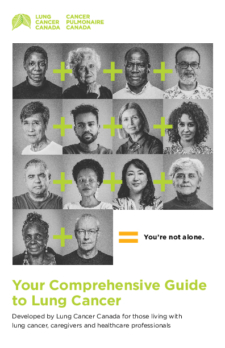Living with Lung Cancer
Receiving a lung cancer diagnosis can be a deeply emotional and unsettling experience. You may find the news shocking and feel scared, sad, angry, or numb.
In the days and weeks that follow your diagnosis, it’s crucial to share your feelings with someone you trust, such as a close family member, friend, or counsellor. Also, engaging in activities you love can offer solace and help you cope with overwhelming emotions. These activities could be listening to music, taking nature walks, practicing mindfulness, or engaging in any other activity that brings you joy. Some people find solace in staying active at work to divert their focus from their diagnosis, while others may take time off work. Whatever approach you choose, remember to prioritize self-care, reach out for support when needed, and hold onto hope.








